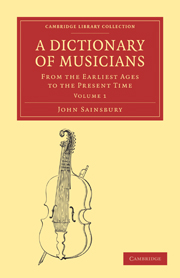Book contents
Summary
DACIER (Anne) died at Paris in 1721. Among her numerous writings we may distinguish a dissertation on the flutes of the ancients, inserted in her edition of “Terence.”
DACOSTA, a clarionet pupil of Charles Duvernoy. He lately belonged to the orchestra of the Théûtre Feydeau, at Paris, He has published some pleasing music for his instrument.
DAGINCOURT, a composer for the harpsichord at Paris. He died at Rouen in 1755.
DAHMEN, (J. A.) an excellent violinist and composer for his instrument. He was born in Holland, and lived many years in England. He flourished in the latter end of the last century.
DALAYRAC, (Nicholas) born in Languedoc, of a noble family, came to Paris young, and served in the gardes-du-corps. He was so struck with the dramatic music of Gretry, the representations of which he scarcely ever failed to attend, that at length he determined to study the science of music, for which he had a strong natural taste, and became the pupil of Langlé. After a few years’ study, Dalayrac made his dibut as a composer at the Opera Comique, by a piece entitled “L' Eclipse totale,” where the germ of his admirable talent was immediately recognised by connoisseurs. It may be remarked of this composer, that he generally showed less originality than Monsigny, and less comic spirit than Gretry, bat as much freedom and nature as either of the foregoing. He, however, peculiarly excelled in grace and sweetness.
- Type
- Chapter
- Information
- Publisher: Cambridge University PressPrint publication year: 2009First published in: 1824



